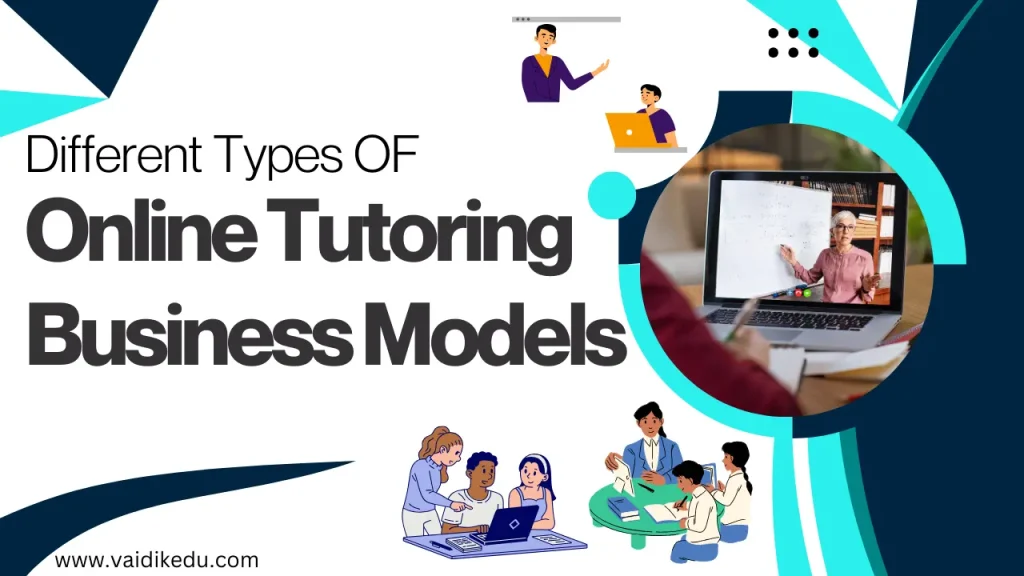Remember when tuition meant packing the bag and off to after-school classes?
A short time ago, it was like that. Fast forward to today, and education is literally in one’s hands. The hassle of travelling to classes has been replaced by logging into a Google Meet or Zoom session.
Online tutoring, a small business run by passionate teachers, has grown into a multibillion-dollar industry now! Nowadays Many Companies offer online tutoring Services, They Have Numerous Teachers Worked There.
So, how did these simple ideas evolve into major educational powerhouses? In this blog, various business models that are driving this amazing transformation are explored.
Business Models OF Online Tutoring
- 1-on-1 tutoring: highly personalized
One-on-one tutoring is a customized teaching format. Tutors can tailor lessons and the entire curriculum to fit individual learning requirements, speed of pace in studying for a certain student too, as well as their style. This will be most beneficial for mastering challenging subjects or preparing for competitive exams.
:- PROS
- High Value For Students
- Strong Tutor- Student Bond
- Premier Pricing
:- CONS
- High cost for students
- Limited scalability
- Time-Intensive
2.Group Tutoring: Learning Together, Growing Together
Group tutoring offers the power of collaborative learning, whereby one tutor teaches many students about a common subject or goal. This method fosters interaction and peer learning while reducing costs for students.
:- PROS
- Cost-Effective
- Interactive Learning
- Increased Reach
:- CONS
- Less personalized attention
- Management Complexity
- Potential for Distractions
- On-Demand Tutoring: Got a question? Get an Answer Now!
On-demand tutoring is perfect for busy students and those who need help immediately. With on-demand tutoring, one can simply sign in and start working with a tutor immediately either because of that one super-hard homework problem or some last-minute exam cramming. Help is just a click away.
:- PROS
- High Flexibility
- On-Demand Revenue
- Scalable Service
:- Cons
- Potential for Inconsistency
- Higher Costs for Students
- Scheduling Complexity
- Subscription-Based Tutoring: All One Can Learn Education
Under this tutoring model, the student pays a recurring fixed fee for ongoing access to tutoring support. It is beneficial for students who require ongoing academic assistance and provides tutors with a consistent source of income.
:- PROS
- Stable Revenue
- Continuous Engagement
- Flexible Access
:- Cons
- High Initial Effort
- Student Retention
- Resource Demands
- The Marketplace Model: Connecting Tutors and Students, One Click at a Time
Within the marketplace model, a platform will simply connect tutors with students. It allows tutors to set rates and demonstrate their skills. The flexibility involved in this process has advantages for both parties but frequently also creates competition, forcing a reduction in prices and hitting the earnings of tutors.
:- PROS
- Wide Reach
- Flexible Pricing
- Diverse Offerings
:- CONS
- High Competition
- Quality Control
- Fees and Commissions
- Course-based tutoring: Pre-Recorded Magic
This model makes the prerecorded lessons available to learners at any time and from any place in the world. It could cover entire subjects or specific skills, thus being flexible and scalable in tutoring.
:- Pros
- Scalable Model
- Passive Income
- Accessible Learning
:- CONS
- Initial Content Creation
- Less personal interaction
- Course Maintenance
- The Freemium Model: Try Before Buying
The freemium models offer basic services for free, then premium features at cost. Students will then be able to get just a few pointers and a sampling of a tutor’s expertise without financial commitment.
:- PROS
- Wide Audience Appeal
- Upselling Opportunities
- Increased Trust
:- CONS
- Conversion Rates
- Resource Intensive
- Potential Revenue Loss
- Live Course Model: Real-Time Learning Experience
Live courses amount to sessions taking place in real-time, not dissimilar to the structure of a regular classroom. This model suits very well for those subjects that have an instant response or dynamic discussion.
:- PROS
- Real-Time Interaction
- Structured Environment
- Community Building
:- CONS
- Scheduling Coordination
- Technical Issues
- Limited Flexibility
- Enterprise Business Model: Tailored Solutions for Organizations
This model provides volume tutoring for companies and institutions, often with either customized training programs or institutional learning environments.
:- PROS
- Large Contracts
- Custom Solutions
- Stable Partnerships
:- CONS
- Complex Management
- High Expectations
- Resource Intensive
- Proposal/Bidding-Based Business Model: Compete for Contracts and Projects
In the proposal or bid-based model, tutors or tutoring services submit proposals for winning contracts or projects. It is common in government or corporate sectors where contracts are given after competitive bidding. Here, detailed proposals must be prepared that describes how the tutor or service will meet the client’s needs. While it allows one to win large contracts, it requires good proposal-writing skills and may be highly competitive.
:- PROS
- Potential for Large Contracts
- Competitive Advantage
- Specialized Opportunities
:- CONS
- Proposal Effort
- High Competition
- Uncertain Outcomes
- Certificate-Based Business Model: Learn, Certify, and Progress
The certificate-based business model simply provides courses that award some kind of formal certification upon completion. It would be a godsend for students who want to advance their careers or gain academic credit. This model is very useful for professional and technical education.
:- PROS
- High Perceived Value
- Premium Pricing Potential
- Appealing to career-oriented individuals
:- CONS
- Significant upfront effort
- Ongoing Maintenance
- Online Booking With Offline Classes Business Model: Online Convenience, Offline Engagement
The model of online booking with offline classes empowers the combination of online scheduling with in-person instruction, making it a hybrid solution well-suited for hands-on or practical subjects like art and music.
:- PROS
- Combines flexibility and effectiveness
- Ideal for Practical Learning
:- CONS
- Logistical Challenges
- Geographical Constraints
- Business to Business Model: Scaling Through Strategic Partnerships
These tutoring companies can partner with businesses either to offer their educational services in staff training or as part of integrated courses across company platforms. Although this scalable model provides long-term contracts with stable revenue, managing such partnerships and specific business requirements may be complex.
:- PROS
- Scalable Model
- Long-Term Partnerships
- Wide Reach
:- CONS
- Complex Management
- Customization Challenges
What’s Next?
Online tutoring is constantly evolving. Already, various models are ranging from 1-on-1 to B2B. It’s not too far for a hybrid model with AI or VR included. That will be revolutionary!
Aspects like:
- The impact on traditional education
- Emerging technologies
- Quality and inclusivity for all learners will be the hot areas in shaping the future of online tutoring.
The only answer to this is the adaptability of entrepreneurs and students.
FAQs
1.Will the one-on-one and group tutoring be online or offline?
Both one-on-one and group tutoring can be conducted offline and online based on the tutor providing services. Factors such as ergonomics and logistics play an important role in deciding that. Online classes will be conducted via video calls through various online platforms like Zoom or Google Meet.
2. For how long will subscription-based tutoring be available?
The subscription will be available based on the plan you pay for. Each organization provides various plans ranging from monthly to yearly. As long as your subscription is active, you can access the services.
3. In the freemium model, can one choose not to upgrade by paying and continue to use it?
Yes, you can use the freemium services without upgrading as well. It will only include the basic free features. Upgrading will be needed only to access premium features, which is optional.
4. Will the tutor in the on-demand tutoring model be available 24/7?
The tutor’s availability varies. Some on-demand services offer 24-hour support, while others have specific working hours. It’s always better to check the availability details provided by each service to know it accurately.









